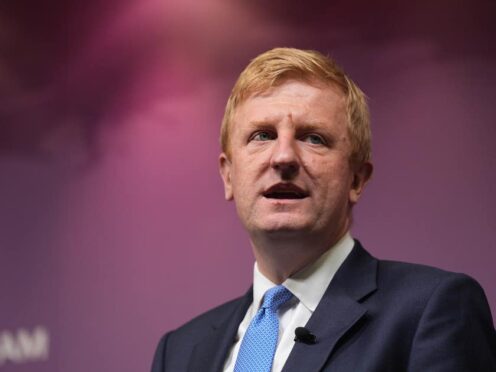University leaders will be briefed by the security services after a Government review found their institutions were being “targeted” by hostile states, the Deputy Prime Minister has said.
The Government ordered a review of protections for higher education in its refreshed Integrated Review of foreign and security policy last year amid concerns that hostile states, and particularly China, were gaining undue influence over the sector.
Speaking on Thursday, Oliver Dowden said that review was now complete, and had found that universities were “vulnerable and are being targeted”.
He said: “As a first step, I will be calling in vice-chancellors to receive a Cobra briefing with our security services to understand the extent of the problem.”
Other steps proposed by the Deputy Prime Minister included consulting on the security of researchers in sensitive areas, increasing transparency in university funding, and examining how existing laws on national security and investment could apply to universities.
He added: “In all of this, my starting position is that universities in this country have thrived literally for a millennium by being open, open to new ideas, by being independent of government.
“So we need to make sure that there’s a high bar for when we actually use any of those tools in intervening in academic freedom and the freedom of universities.
“But just as we are willing to intervene in the freedom of businesses, we also need to be willing to intervene if there is a clear national security risk that we need to address.”
Campaigns have previously raised concerns about the growing influence of foreign states on British universities, including through anonymous donations to institutions and an increasing dependence on foreign students.
Watch the Deputy Prime Minister's speech on economic security at Chatham House https://t.co/Z2yzPuSViO
— Cabinet Office (@cabinetofficeuk) April 18, 2024
Last month, the university free speech tsar Professor Arif Ahmed warned that concerns about relations with foreign countries could interfere with academic freedoms or freedom of speech on campuses.
Other concerns have been raised about the transfer of technology and intellectual property through partnerships with potentially hostile states.
Mr Dowden’s comments came as he took questions from an audience at the think tank Chatham House following a speech arguing the UK needed to bolster its economic defences.
The Deputy Prime Minister warned that rising geopolitical tension was exposing the “security risks” behind globalisation, saying the UK needed to be “clear-eyed” that openness brought vulnerabilities as well as strengths.
In a speech at @ChathamHouse, Deputy PM @OilverDowden, set out plans to improve 🇬🇧 ability to handle shocks to economic security.
He said: “We do not make ourselves more secure by being less open..instead we redouble our efforts to make our open market as secure as possible”
— Cabinet Office (@cabinetofficeuk) April 18, 2024
While he was adamant that the UK would do “decouple” from the global economy, he warned that Britain’s open economy was being “targeted by state-based actors and their proxies”.
He set out a series of steps designed to improve economic security including a review of export controls of emerging technologies and the risks from UK businesses investing overseas.
The Cabinet Office will also publish a response to a review of the National Security and Investment Act passed in 2021, which will announce plans to “fine-tune” the system, including how it relates to critical minerals and semiconductors.
The Government has already used the Act to block a number of deals, including several involving attempts by Chinese companies to acquire assets in the UK’s semiconductor industry.
Responding to the speech, Labour’s shadow Cabinet Office minister Pat McFadden said the Government’s approach to national security and China had been “marred by inconsistencies” and “left the UK vulnerable to threats” such as cyber attacks.
He added: “Labour would ensure the UK would make the most of the fantastic technology and innovation we have while maintaining and bolstering our national resilience.”
